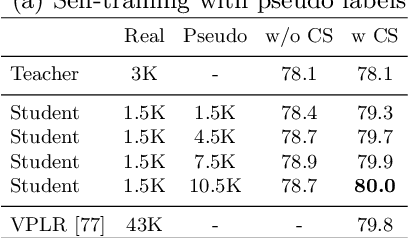Improving Semantic Segmentation via Self-Training
Paper and Code
May 06, 2020



Deep learning usually achieves the best results with complete supervision. In the case of semantic segmentation, this means that large amounts of pixelwise annotations are required to learn accurate models. In this paper, we show that we can obtain state-of-the-art results using a semi-supervised approach, specifically a self-training paradigm. We first train a teacher model on labeled data, and then generate pseudo labels on a large set of unlabeled data. Our robust training framework can digest human-annotated and pseudo labels jointly and achieve top performances on Cityscapes, CamVid and KITTI datasets while requiring significantly less supervision. We also demonstrate the effectiveness of self-training on a challenging cross-domain generalization task, outperforming conventional finetuning method by a large margin. Lastly, to alleviate the computational burden caused by the large amount of pseudo labels, we propose a fast training schedule to accelerate the training of segmentation models by up to 2x without performance degradation.
 Add to Chrome
Add to Chrome Add to Firefox
Add to Firefox Add to Edge
Add to Edge